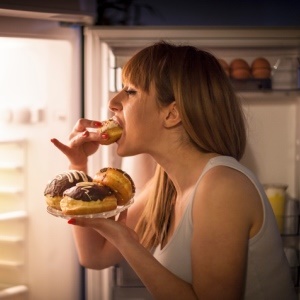
You need to lose weight and you're doing your best to stick to your meal plans by avoiding snacking and overeating.
This might be relatively easy during the day, but the hours after sunset can be tough for folks trying to stay slim, new research shows.
Stress plays a role
A small study suggests that you're more likely to overeat in the evening – especially if you're feeling stressed.
A previous Health24 article points out that limiting late-night eating has been shown to result in weight loss.
"The good news is that having this knowledge, people could take steps to reduce their risk of overeating by eating earlier in the day, or finding alternative ways to deal with stress," said study lead researcher Susan Carnell. She's an assistant professor of psychiatry and behavioural sciences at the Johns Hopkins School of Medicine in Baltimore.
The study was published recently in the International Journal of Obesity.
The science behind the study focuses on ghrelin, a "hunger hormone", and peptide YY, a hormone tied to feelings of fullness.
Hunger and fullness hormones
The study tracked 32 overweight or obese people, aged 18 to 50. Half of the participants had long struggles with overeating, having been diagnosed with binge-eating disorder.
In the study, all of the participants fasted for eight hours, then got a liquid 608-calorie meal at either 9 a.m. or 4 p.m. About two hours after that meal, the participants were "stressed" by placing a hand in a bucket of cold water for two minutes.
Then 30 minutes later, everyone was offered a buffet laden with pizza, snack chips, cookies and chocolate-covered candies.
Blood tests tracked levels of both the hunger hormone and the fullness hormone throughout the experiment.
According to Carnell's team, hunger hormone levels rose and fullness hormone levels fell more in the evening compared to the morning.
Evening is a high-risk time
The stress test seemed to push ghrelin levels even higher – but only in the evening, the study found.
The bottom line is that "evening is a high-risk time for overeating, especially if you're stressed and already prone to binge-eating," Carnell said in a university news release.
Also, the impact that hormones had on appetite was found to be greater among binge-eaters, the study found.
Image credit: iStock




 Publications
Publications
 Partners
Partners










